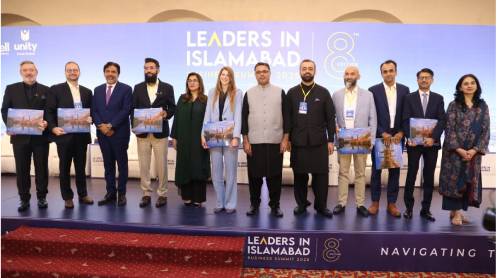Islamabad, April 17, 2025- LEADERS IN ISLAMABAD BUSINESS SUMMIT (LIIBS) 2025, themed Navigating the Unknown, came to a powerful close with globally recognized leaders, policy makers, experts, and thousand plus delegates, deliberating on unified approach, consistency of reform, technology and investment landscape, for Pakistan.
Shahid Khaqan Abbasi, former Prime Minister of Pakistan, reinforced the need for stability and continuity of policies, with a focus on the need for privatization. “Weak regulation has massively contributed to increasing circular debt, and loss of investments. Stability and rule of law are a must to take any step in the future.”
Asad Umar, Pakistan’s former Minister for Finance, Planning & Development, stressed on the construct of true democracies and insisted that Pakistan needs to strengthen its institutions, “The entire nation seems to be in conflict. Pakistan needs to abide by systems. As a multi-ethnic country, Pakistan must prioritize local governance.” Sohail Aman, Pakistan’s Chief of Air Staff (2015-2018) & Chief Executive Strategic Engagements, Nutshell Group, provided the lasting message that summed up the two days of conference and created a perfect hook for the next, “Pakistan belongs to us all, and the Constitution is sovereign. Our collective objective is to see Pakistan great, and we will continue navigating the unknown for newer opportunities.”
Earlier in the day, global and local leaders converged in a series of high-impact sessions on digital futures, resilient ecosystems, hidden markets, and economic transformation.
Three following addresses encapsulated the best practices of leading digital economies; Michael Foley, Advisor, Watu Global, highlighted African Experience in Bridging the Digital Divide. Building on inclusivity in digitalization and talking of data for women and informal workers in Pakistan, he said, “Affordability is still a challenge, and private sector-led initiatives are critical to build Pakistan as a digital economy.” Prof. Michael Sung, Chairman, CarbonBlue Innovations & HorizenDigital and Founding Director, Institute of Digital Finance Innovation, Zhejiang International Business School Topic, continued in the same stream with a focus on the transformational potential of digital finance, “We are entering the age of programmable economies – The focus must be on the interoperability of these currencies as they sit on silo ecosystems.” Maz Hussain, Partner, Digital Lighthouse Leader, KPMG Saudi Arabia, shared, “Pakistan has immense potential for IT hubs – creating blueprints to harness the power of AI and drive digital transformation. Enable innovation, embed intelligence, and evolve endlessly.”
Relevant to the theme of the conference were the immediate steps too, and in the following panel discussion titled, What Matters Now, Saquib Ahmad, Country Managing Director, SAP Pakistan, Iraq, Afghanistan & Bahrain, being the moderator put forward some very profound questions regarding the future of Asian countries in the digital age.
The dialogue on Pakistan’s Economy & Business Climate, addressed the question if Pakistan is Ready for a Turnaround? Moderated by Sajjeed Aslam, Partner, Spectreco LLC, USA, it featured Muhammad Azfar Ahsan, Pakistan’s former Minister for Investment, Dr. Amjad Waheed, Chief Executive Officer, NBP Funds, and Ali Khizar, Director Research, Business Recorder. Azfar’s call to the nation was aptly phrased as “Pakistan’s total FDI in the last three plus decades, averages on less than USD 2 billion, and pales in comparison to India’s last year’s alone. We have to think as Pakistanis first, facilitate the present investor and ensure long term planning.” Dr. Amjad focused on the policy making especially in the realm of education; “We have not invested in human capital for decades. The literacy rate in schools is only 45%, which means that 45 million children are deprived of education. 75% of children are either out of school or receiving substandard education.” Ali kept the conversation focused on the dynamics of economic impact, “We must uplift our people using technology. The painful process of fiscal consolidation is having an impact on the macro indicators. High taxes with low enforcement is a recipe for an informal economy to grow, we need to change this.”
The Summit was successfully moderated by Teymoor Nabili, a globally recognized journalist and anchor with experience at Al Jazeera English, CNBC, CNN, and BBC. With a strong background in geopolitics, finance, and global affairs, Teymoor’s presence ensured the conversations were not only relevant but resonant.
As Pakistan moves forward, the call from LIIBS 2025 is clear: Navigating the Unknown requires embracing uncertainty as a gateway to innovation, not an obstacle to progress. Pakistan must invest fearlessly in its people, build alliances that transcend borders, and reimagine industries for a sustainable and inclusive future. Navigating the Unknown demands bold risk-oriented thinking, collaboration, and understanding of securing and interpreting data on continuous basis for setting and resetting of the course as and when the global dynamics change, as change is the only constant.
LIIBS 2025 Concludes – Powerful Commitments to Innovation, Inclusion & Economic Resilience





